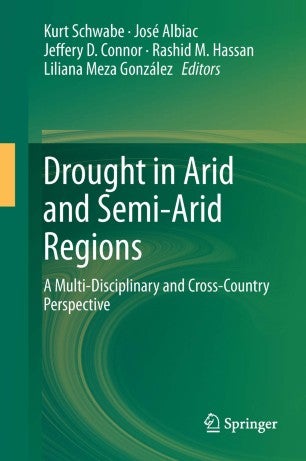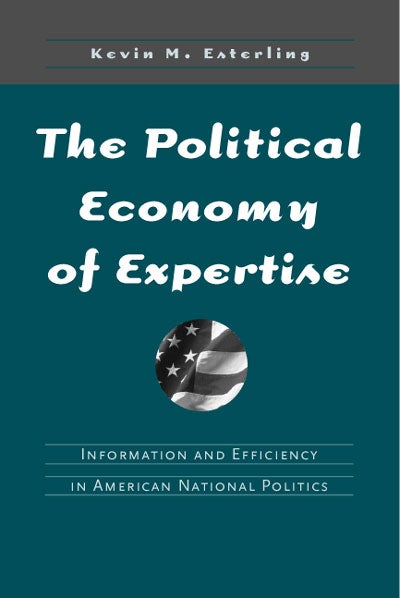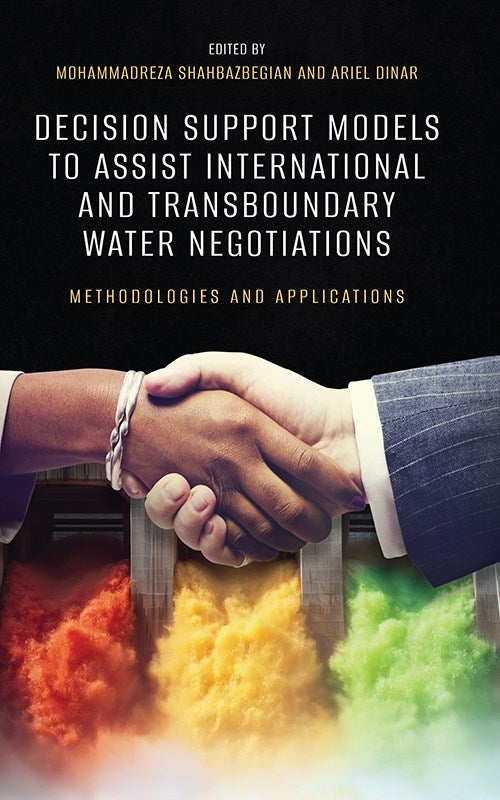
Decision Support Models to Assist International and Transboundary Water Negotiations: Methodologies and Applications
2026, Oxford University Press
Mohammadreza Shahbazbegian, Ariel Dinar
Decision Support Models to Assist International Transboundary Water Negotiations: Methodologies and Applications is a groundbreaking scholarly work that offers a comprehensive examination of decision support models in transboundary water management. The book is strategically organized into two primary sections. Part 1 focuses on methodological papers, introducing cutting-edge theoretical frameworks such as the painted water theory and exploring sophisticated decision analysis techniques for conflict resolution; notably, it presents novel approaches like the Smartsettle Infinity method for renegotiating complex water treaties and multi-criteria decision analysis for addressing transboundary water resource management. Part 2 offers a collection of case studies from different parts of the world that demonstrate the methodological approaches in Part 1 in real-world contexts. These chapters explore diverse international river basins, including those of the Helmand River, the Congo River, and the Colorado River. Each case study provides unique insights into applying decision support models, examining challenges through interdisciplinary lenses that incorporate system dynamics, international water law, economic considerations, and climate change impacts. The book’s strength lies in its holistic approach, bridging theoretical innovations with practical applications. The international team of experts from various disciplines offers a nuanced, comprehensive strategy for navigating the complex landscape of water negotiations. The final chapter provides forward-looking perspectives on employing decision support models in future water diplomacy efforts. This volume is an essential resource for researchers, policymakers, water resource managers, and diplomats seeking sophisticated, data-driven approaches to resolving international water-sharing challenges.
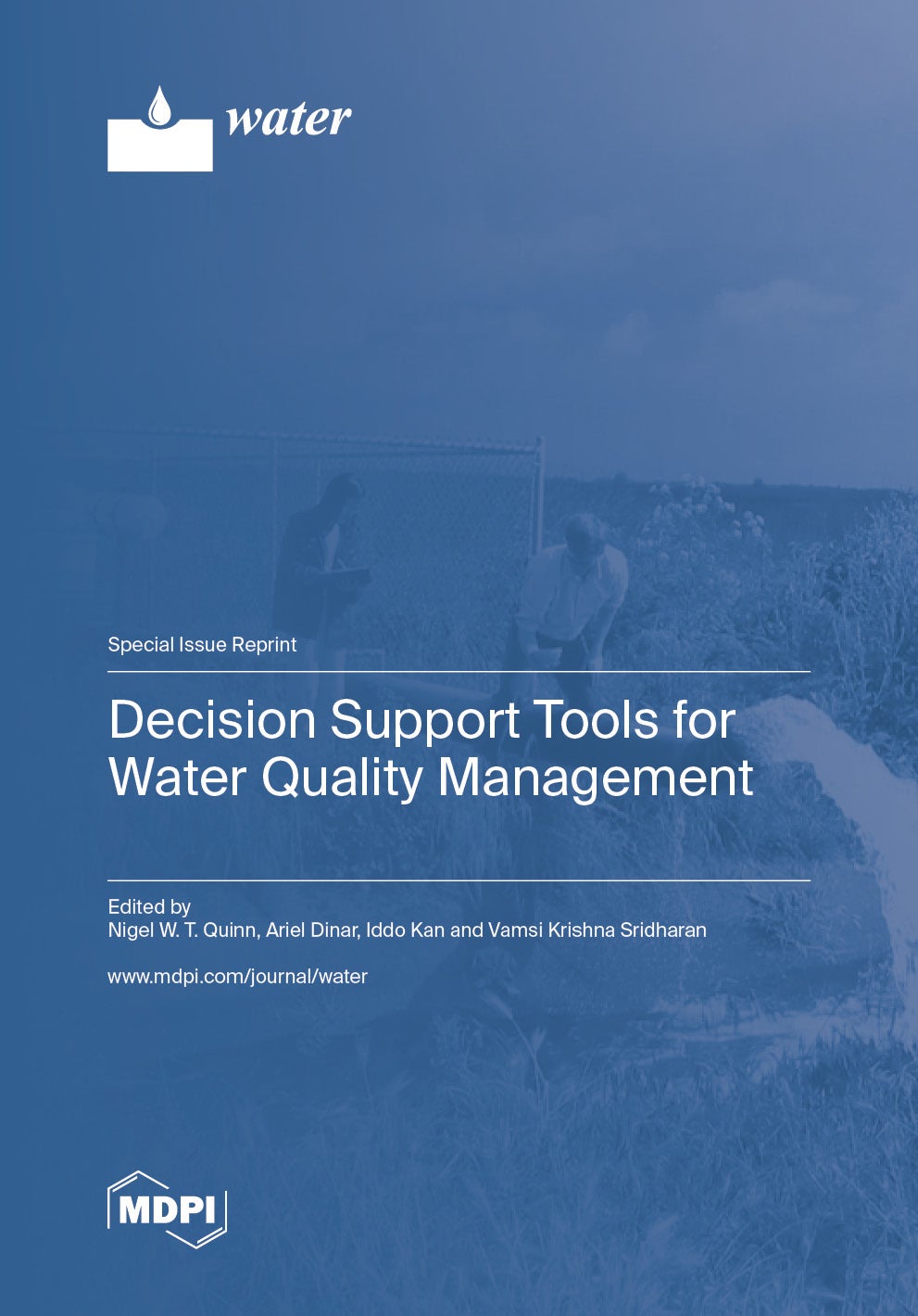
Decision Support Tools for Water Quality Management
2023, MDPI
Nigel W. T. Quinn, Ariel Dinar, Iddo Kan and Vamsi Krishna Sridharan
The sustainability of water resources worldwide is increasingly imperiled as climate change contributes to the human-induced problems of water supply scarcity and maldistribution. Environmental problems associated with water quality, such as aquifer depletion, land subsidence, the seasonal drying of river flows, waterlogging, the salinization of rivers and groundwater, and human health problems from the excessive use of fertilizers and pesticides will require a radical re-thinking of resource-management policy and new tools to help analysts and regulators craft novel solutions. Over the past several decades, with the advent and rapid progress of computational technology, watershed models have increasingly become important and effective tools for tackling a wide range of water resource and environmental management issues and for supporting regulatory compliance. Statistical and machine-learning methods are being used to support and even supplant more traditional simulation models to improve the estimation of the temporal dynamics and patterns of variability in pollutant concentrations and loads. With the advancements in modeling approaches for water quality, there have also been developments in decision-support tools for water quality management. This reprint describes innovative decision-support approaches from around the world and across sectors that can be applied by stakeholders, government entities, and regulators to reduce environmental pollution and result in cost-effective and sustainable water management strategies.
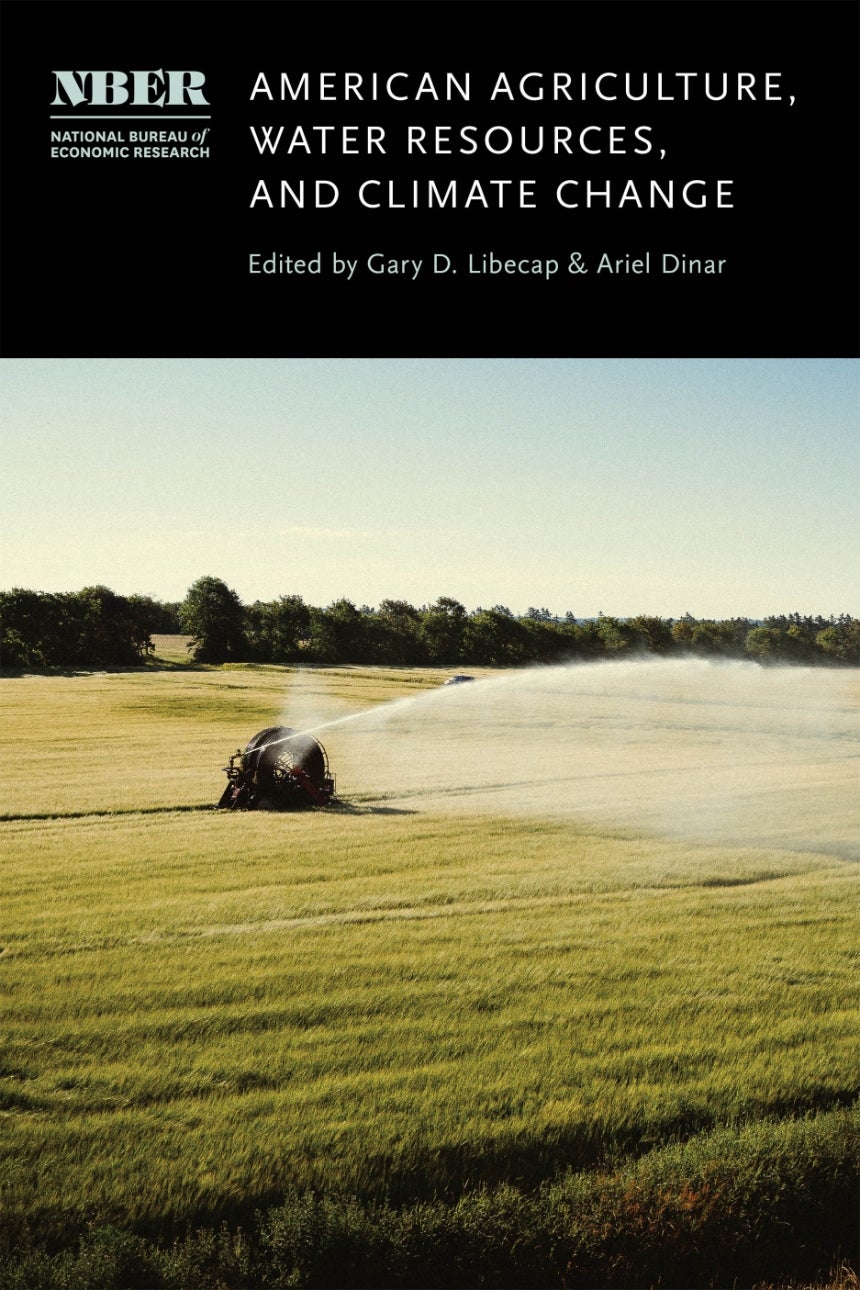
American Agriculture, Water Resources, and Climate Change
2023, The University of Chicago Press
Gary D. Libecap and Ariel Dinar
Agriculture has been critical in the development of the American economy. Except in parts of the western United States, water access has not been a critical constraint on agricultural productivity, but with climate change, this may no longer be the case. This volume highlights new research on the interconnections between American agriculture, water resources, and climate change. It examines climatic and geologic factors that affect the agricultural sector and highlights historical and contemporary farmer responses to varying conditions and water availability. It identifies the potential effects of climate change on water supplies, access, agricultural practices, and profitability, and analyzes technological, agronomic, management, and institutional adjustments. Adaptations such as new crops, production practices, irrigation technologies, water conveyance infrastructure, fertilizer application, and increased use of groundwater can generate both social benefits and social costs, which may be internalized with various institutional innovations. Drawing on both historical and present experiences, this volume provides valuable insights into the economics of water supply in American agriculture as climate change unfolds.
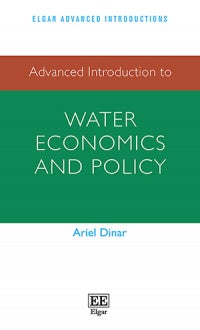
Advanced Introduction to Water Economics and Policy
2022, Edward Elgar Publishing
Ariel Dinar
Advanced Introduction to Water Economics and Policy highlights various aspects of economic and policy considerations as they are applied to water decision-making and evaluation in a comprehensive and clear manner.
Key Features:
• Presents example-based simplified descriptions of water problems and economic principles used to address them
• Provides examples from different countries and analysis of main water-using sectors
• Highlights emerging topics in water economics that address water scarcity and discusses economic and policy aspects related to the management of water at local, regional and international scales
Researchers and students will appreciate the comprehensive, straightforward presentation of critical information in this Advanced Introduction that does not get lost in technical jargon.
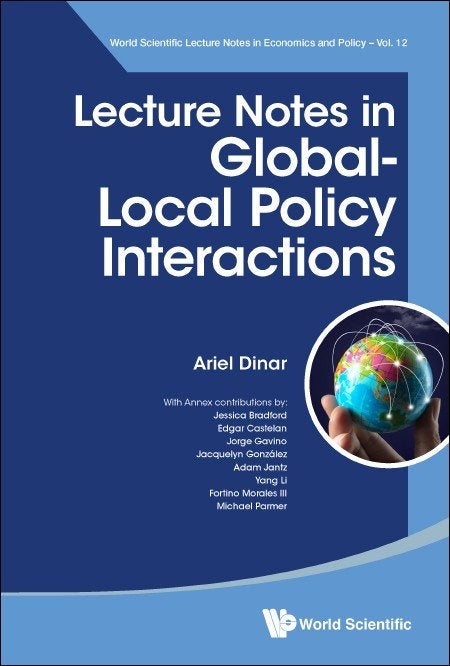
Lecture Notes in Global-Local Policy Interactions
2022, World Scientific
Ariel Dinar
Lecture Notes in Global-Local Policy Interactions discusses the process of building and managing a global public policy and the interaction of public policies at the global and local (national/regional) levels. This book demonstrates the global negative externalities from under-regulation of various activities by one agent/country that affect the well-being of other agents/countries, and the design of policies (agreements) to reduce the impacts of such externalities. Possible opposed interests to global policies of local stakeholders and the (local) policies they established to tackle such externalities in their jurisdictions are included as well.
The book introduces concepts and principles associated with conflict, negotiation and cooperation, all of which are part of policy reform and design. It explores to various extents the global-local interactions that are related to selected global policies. Special emphasis is placed on global policies such as climate change, water, anti-terrorism, tobacco control, regulation of substances that deplete the ozone layer, desertification, and elimination of anti-personnel mines.
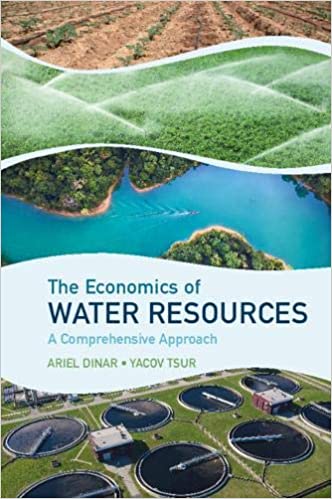
The Economics of Water Resources: A Comprehensive Approach
2021, Cambridge University Press
Ariel Dinar and Yacov Tsur
Population growth and rising living standards, on the one hand, and changing climate, on the other hand, have exacerbated water scarcity worldwide. To address this problem, policymakers need to take a wide view of the water economy – a complex structure involving environmental, social, economic, legal, and institutional aspects. A coherent water policy must look at the water economy as a whole and apply a comprehensive approach to policy interventions. Written by two of the world's leading scholars on economics of water, this is the first graduate-level textbook on the topic. The book discusses water resource management within a comprehensive framework that integrates the different, yet highly entwined, elements of a water economy. It follows the steps needed to develop a well-designed set of policies based on detailed analyses of intervention measures, using multi-sectoral and economy-wide examples from a variety of locations and situations around the world.
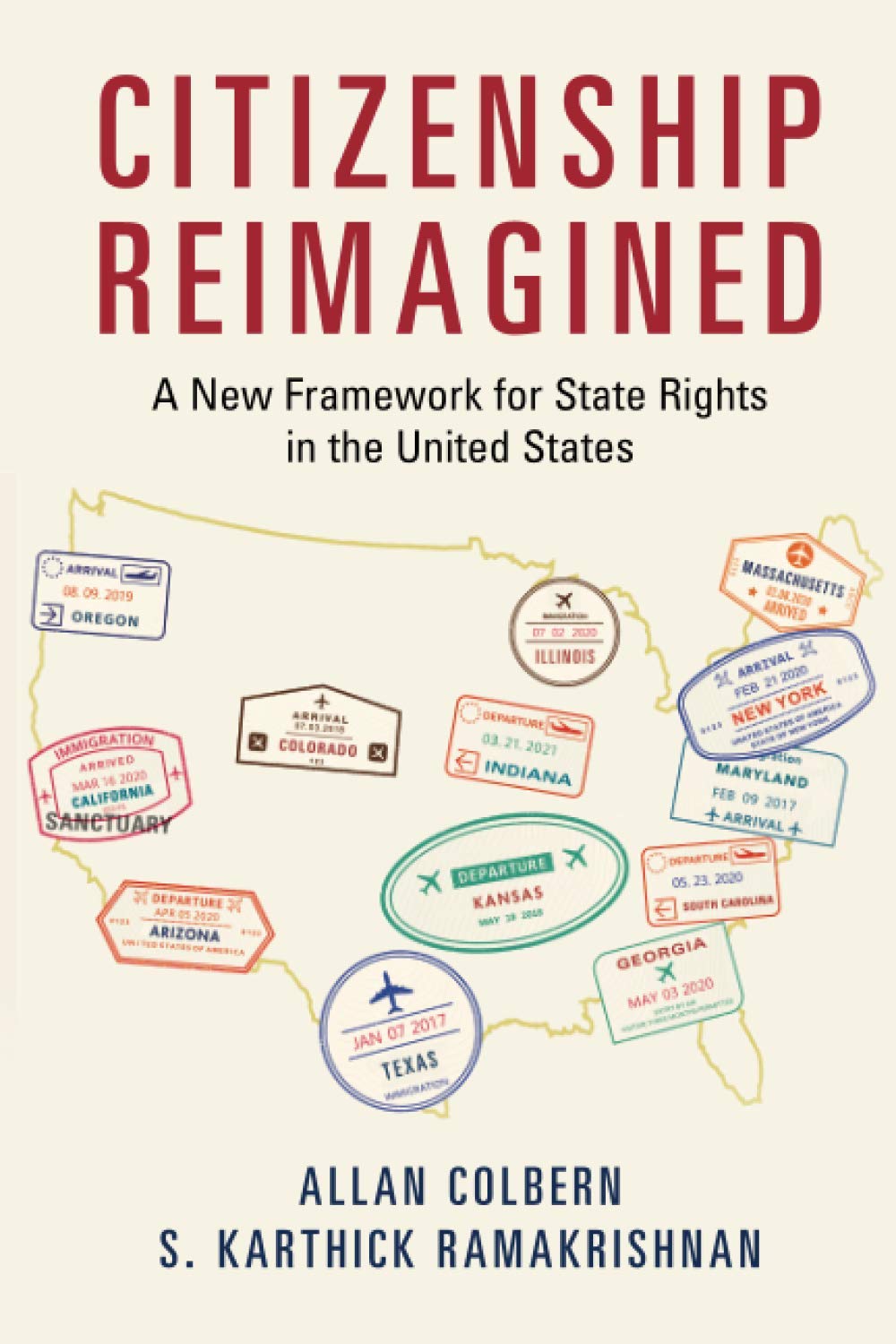
Citizenship Reimagined
2020, Cambridge University Press
Karthick Ramakrishnan and Allan Colbern
The United States is entering a new era of progressive state citizenship, with California leading the way. A growing number of states are providing expanded rights to undocumented immigrants that challenge conventional understandings of citizenship as binary, unidimensional, and exclusively national. In Citizenship Reimagined, Allan Colbern and S. Karthick Ramakrishnan develop a precise framework for understanding and measuring citizenship as expansive, multi-dimensional, and federated - broader than legal status and firmly grounded in the provision of rights. Placing today's immigration battles in historical context, they show that today's progressive state citizenship is not unprecedented: US states have been leaders in rights expansion since America's founding, including over the fight for black citizenship and women's suffrage. The book invites readers to rethink how American federalism relates to minority rights and how state laws regulating undocumented residents can coexist with federal exclusivity over immigration law.
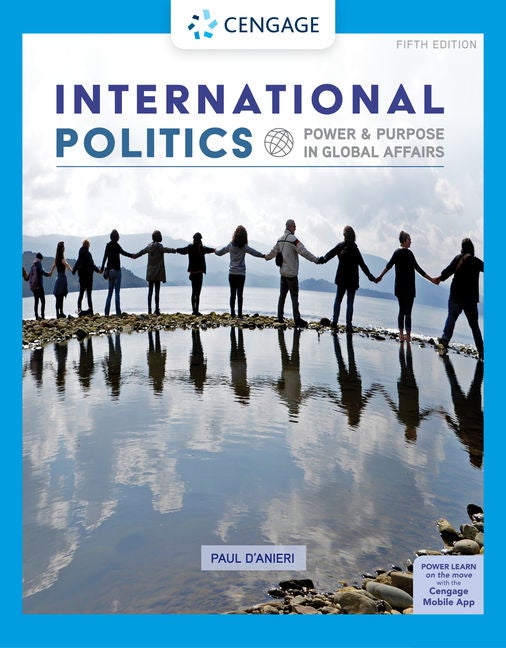
International Politics: Power and Purpose in Global Affairs, 5th Ed.
2020, Cengage
Paul D'Anieri
In INTERNATIONAL POLITICS: POWER AND PURPOSE IN GLOBAL AFFAIRS, 5th Edition, Paul D'Anieri uses the theme of power and purpose to examine five paradigms of international relations theory and to connect the scholarly analysis of international politics to policy problems and contemporary affairs. He presents the study of international politics as a series of intellectual puzzles and policy problems -- and helps students make the connections between theory and policy, between history and the present, and between ideals and constraints. The author also addresses common student deficiencies in history, policy, and geography through case studies of real-world events; and emphasizes the importance of examining problems from multiple perspectives.

Ukraine and Russia: From Civilized Divorce to Uncivil War
2019, Cambridge University Press
Paul D'Anieri
The book explores the dynamics within Ukraine, between Ukraine and Russia, and between Russia and the West, that emerged with the collapse of the Soviet Union and eventually led to war in 2014. D’Anieri argues the conflict has worsened because of three underlying factors—the security dilemma, the impact of democratization on geopolitics, and the incompatible goals of a post-Cold War Europe. Rather than a peaceful situation that was squandered, D’Anieri argues that these were deep-seated pre-existing disagreements that could not be bridged, with concerning implications for the resolution of the Ukraine conflict.
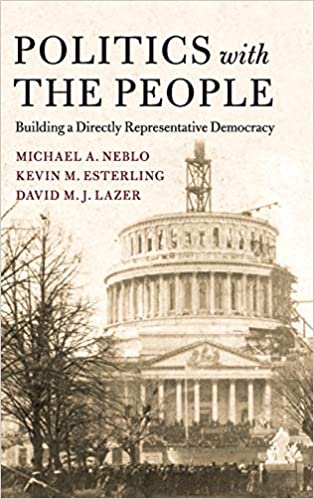
Politics with the People: Building a Directly Representative Democracy
2018, Cambridge University Press
Kevin Esterling, Michael Neblo, and David Lazer
Many citizens in the US and abroad fear that democratic institutions have become weak, and continue to weaken. Politics with the People develops the principles and practice of 'directly representative democracy' - a new way of connecting citizens and elected officials to improve representative government. Sitting members of Congress agreed to meet with groups of their constituents via online, deliberative town hall meetings to discuss some of the most important and controversial issues of the day. The results from these experiments reveal a model of how our democracy could work, where politicians consult with and inform citizens in substantive discussions, and where otherwise marginalized citizens participate and are empowered. Moving beyond our broken system of interest group politics and partisan bloodsport, directly representative reforms will help restore citizens' faith in the institutions of democratic self-government, precisely at a time when those institutions themselves feel dysfunctional and endangered.
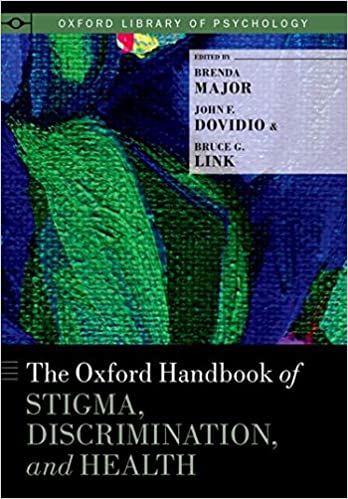
The Oxford Handbook of Stigma, Discrimination, and Health
2017, Oxford University Press
Bruce G. Link, Brenda Major, and John F. Dovidio
Stigma leads to poorer health. Edited by Brenda Major, John F. Dovidio, and Bruce G. Link, The Oxford Handbook of Stigma, Discrimination, and Health provides compelling evidence from various disciplines in support of this thesis and explains how and why health disparities exist and persist.
Stigmatization involves distinguishing people by a socially conferred "mark," seeing them as deviant, and devaluing and socially excluding them. The core insight of this book is that the social processes of stigma reliably translate into the biology of disease and death. Contributors elucidate this insight by showing exactly how stigma negatively affects health and creates health disparities through multiple mechanisms operating at different levels of influence.
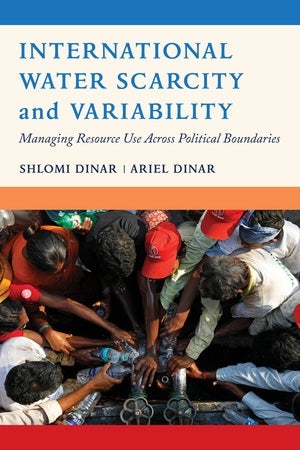
International Water Scarcity and Variability: Managing Resource Use Across Political Boundaries
2016, University of California Press
Shlomi Dinar and Ariel Dinar
International Water Scarcity and Variability considers international water management challenges created by water scarcity and environmental change. Although media coverage and some scholars tend to cast natural resource shortages as leading inexorably toward armed conflict and war, Shlomi Dinar and Ariel Dinar demonstrate that there are many examples of and mechanisms for more peaceful dispute resolution regarding natural resources, even in the face of water paucity and climate change. The authors base these arguments on both global empirical analyses and case studies. Using numerous examples that focus on North America, Europe, Central Asia, and the Middle East, this book considers strategies and incentives that help lessen conflict and motivate cooperation under scarcity and increased variability of water resources.
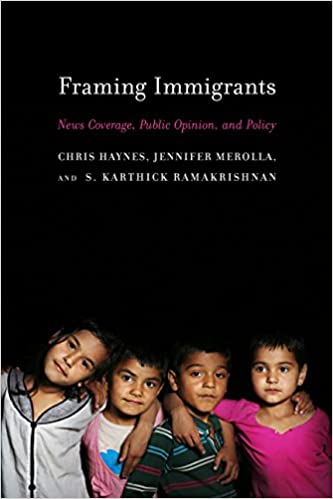
Framing Immigrants: News Coverage, Public Opinion, and Policy
2016, Russell Sage Foundation
Karthick Ramakrishnan, Chris Haynes, and Jennifer Merolla
While undocumented immigration is controversial, the general public is largely unfamiliar with the particulars of immigration policy. Given that public opinion on the topic is malleable, to what extent do mass media shape the public debate on immigration? In Framing Immigrants, political scientists Chris Haynes, Jennifer Merolla, and Karthick Ramakrishnan explore how conservative, liberal, and mainstream news outlets frame and discuss undocumented immigrants. Drawing from original voter surveys, they show that how the media frames immigration has significant consequences for public opinion and has implications for the passage of new immigration policies.
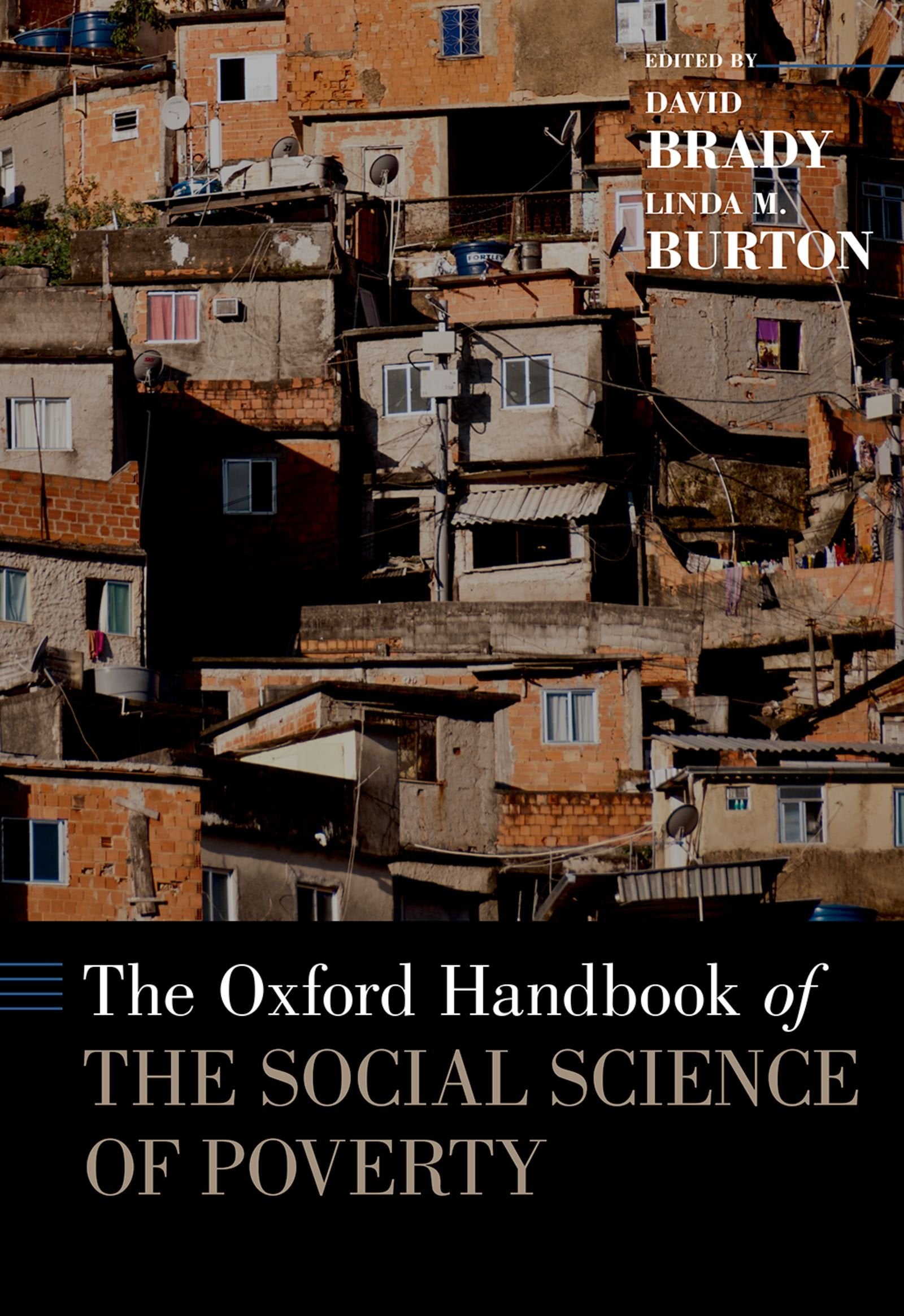
The Oxford Handbook of the Social Science of Poverty
2016, Oxford University Press
David Brady and Linda M. Burton
Despite remarkable economic advances in many societies during the latter half of the twentieth century, poverty remains a global issue of enduring concern. Poverty is present in some form in every society in the world, and has serious implications for everything from health and well-being to identity and behavior. Nevertheless, the study of poverty has remained disconnected across disciplines.
The Oxford Handbook of the Social Science of Poverty builds a common scholarly ground in the study of poverty by bringing together an international, inter-disciplinary group of scholars to provide their perspectives on the issue. Contributors engage in discussions about the leading theories and conceptual debates regarding poverty, the most salient topics in poverty research, and the far-reaching consequences of poverty on the individual and societal level. The volume incorporates many methodological perspectives, including survey research, ethnography, and mixed methods approaches, while the chapters extend beyond the United States to provide a truly global portrait of poverty.
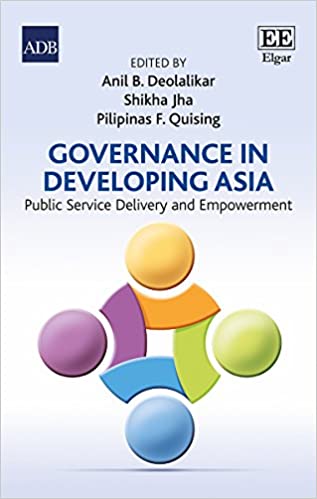
Governance in Developing Asia: Public Service Delivery and Empowerment
2015, Edward Elgar Publishing
Anil Deolalikar, Shikha Jha, and Pilipinas F. Quising
Governance in Developing Asia is one of the first books of its kind to provide an overview of the role that better governance and citizen empowerment can play in improving public service delivery in developing Asia. The World Development Report 2004 set a framework for public service delivery in terms of the short and long roads to accountability of service providers to citizens. More than a decade on, this important book revisits the issue and departs from the WDR framework, highlighting its shortcomings and offering alternative solutions. The contributors present fresh evidence on the relationship between governance and development outcomes, including growth and indicators of living standards. They argue that the Asia-Pacific region must do better in delivering essential public services if it wishes to continue improving the quality of life for millions of its people. They show how the quantity and quality of public services in a country can be improved if the government actively solicits citizen involvement in service delivery.
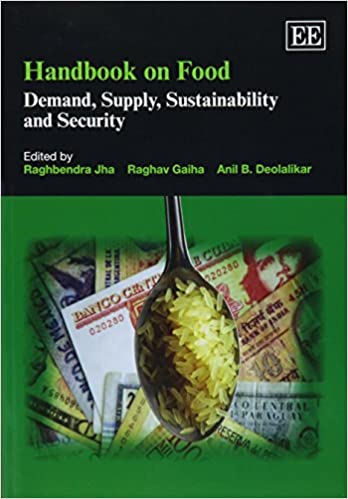
Handbook on Food: Demand, Supply, Sustainability and Security
2015, Edward Elgar Publishing
Anil Deolalikar, Raghbendra Jha, and Raghav Gaiha
The global population is forecasted to reach 9.4 billion by 2050, with much of this increase concentrated in developing regions and cities. Ensuring adequate food and nourishment to this large population is a pressing economic, moral and even security challenge and requires research (and action) from a multi-disciplinary perspective.
This book provides the first such integrated approach to tackling this problem by addressing the multiplicity of challenges posed by rising global population, diet diversification and urbanization in developing countries and climate change.

Handbook of Water Economics
2015, Edward Elgar
Ariel Dinar and Kurt Schwabe
This comprehensive Handbook explores the role that economics plays in water resource use, management, and policy. The contributors cover a continuum of topics that individually and jointly represent the state of the art of water economics. Leading scholars demonstrate ways in which economic theory, tools, and analyses have been used to address a variety of water-related issues over the years and, subsequently, to create better-informed policy and management decisions. Acknowledging and building upon the seminal research related to water economics, this book offers a current and provocative exploration of a variety of topic.
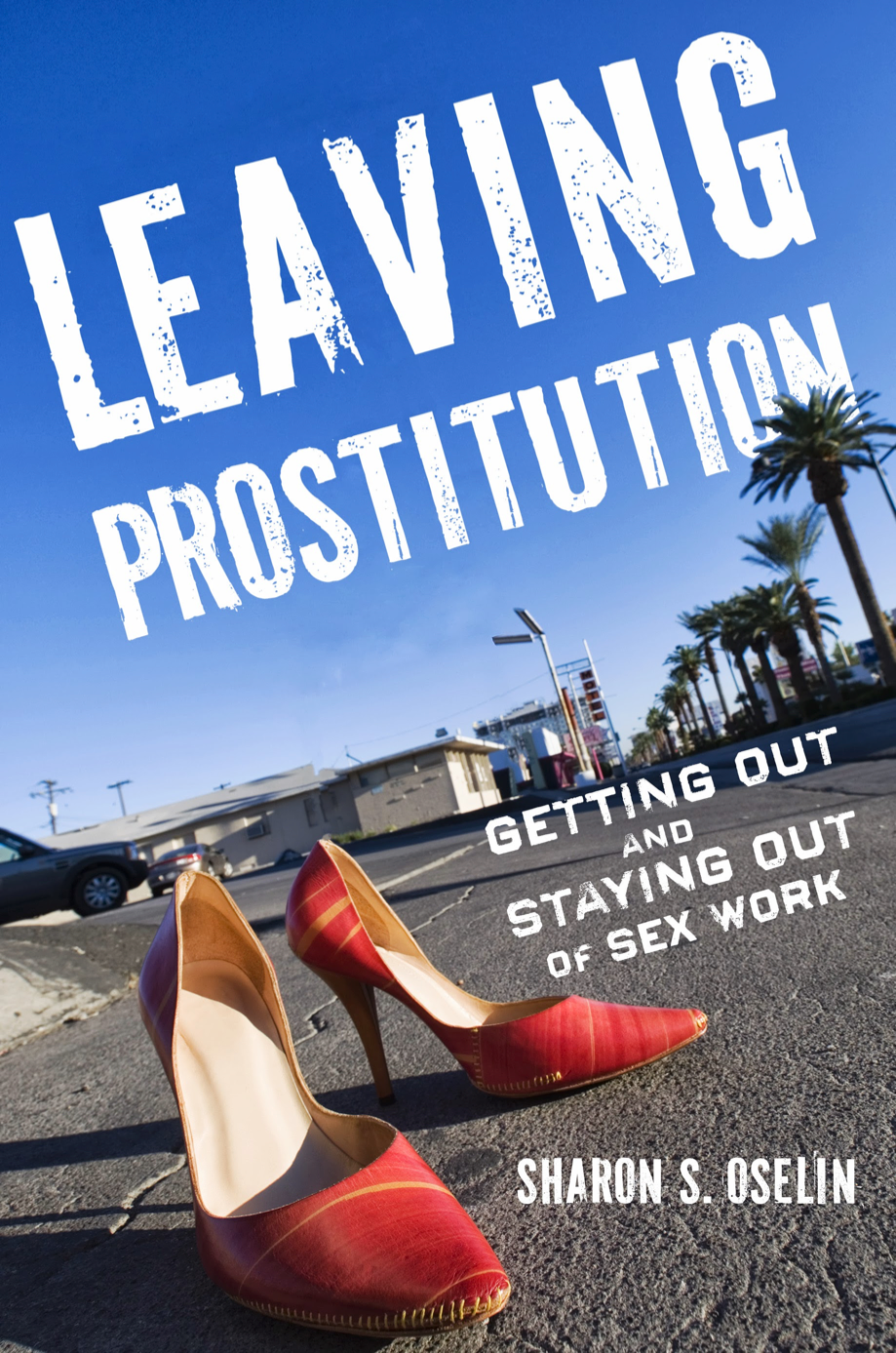
Leaving Prostitution: Getting Out and Staying Out of Sex Work
2014, New York University Press
Sharon Oselin
This book examines a relatively neglected aspect of sex work—the process through which women leave it. To do so, Oselin draws on ethnographic observations and interviews at four U.S. non-profit organizations to assess whether they facilitate or constrain such transitions. Leaving Prostitution not only sheds light on the social and organizational control mechanisms that encourage these changes but also reveals the agency clients exhibit along the way to determine their own path. Oselin finds that women who leave street sex work do so by moving through three distinct stages of change, a shift fostered by control mechanisms as well as individual factors.
Drought in Arid and Semi-arid Regions: A Multi-disciplinary and Cross-Country Perspective
2013, Springer Publishing
Kurt Schwabe, Jose Albiac, Jeffery D. Connor, Rashid M. Hassan, Liliana Meza González
Offering a cross-country examination and comparison of drought awareness and experience, this book shows how scientists, water managers, and policy makers approach drought and water scarcity in arid and semi-arid regions of Spain, Mexico, Australia, South Africa and the United States.
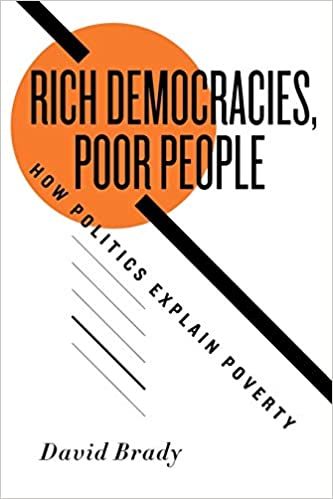
Rich Democracies, Poor People: How Politics Explain Poverty
2009, Oxford University Press
David Brady
Poverty is not simply the result of an individual's characteristics, behaviors or abilities. Rather, as David Brady demonstrates, poverty is the result of politics. In Rich Democracies, Poor People, Brady investigates why poverty is so entrenched in some affluent democracies whereas it is a solvable problem in others. Drawing on over thirty years of data from eighteen countries, Brady argues that cross-national and historical variations in poverty are principally driven by differences in the generosity of the welfare state. An explicit challenge to mainstream views of poverty as an inescapable outcome of individual failings or a society's labor markets and demography, this book offers institutionalized power relations theory as an alternative explanation. The power of coalitions for egalitarianism, Leftist political groups and parties, and the social policies they are able to institutionalize shape the amount of poverty in society. Where poverty is low, equality has been institutionalized. Where poverty is widespread, exemplified by the U.S., there has been a failure to institutionalize equality. A comprehensive and state-of-the-art study, Rich Democracies, Poor People places the inherently political choices over resources and the political organization of states, markets, and societies at the center of the study of poverty and social inequality.
The Political Economy of Expertise
2004, University of Michigan Press
Kevin Esterling
The Political Economy of Expertise is a carefully argued examination of how legislatures use expert research and testimony. Kevin Esterling demonstrates that interest groups can actually help the legislative process by encouraging Congress to assess research and implement well-informed policies.
More than mere touts for the interests of Washington insiders, these groups encourage Congress to enact policies that are likely to succeed while avoiding those that have too great of a risk of failure. The surprising result is greater legislative efficiency. The Political Economy of Expertise illustrates that this system actually favors effective and informed decision making, thereby increasing the likelihood that new policies will benefit the American public.

